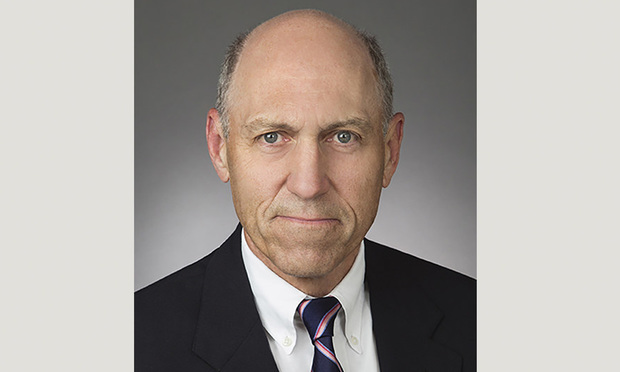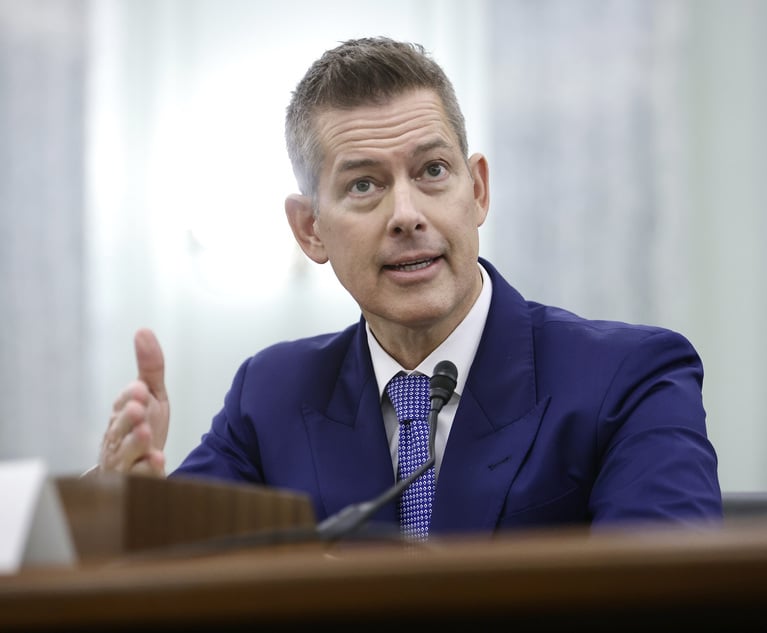Former US House General Counsel Remembers Tip O'Neill and Raising Level of the Job
Stanley Brand discusses his role in modernizing the office of general counsel for the U.S. House of Representatives.
March 01, 2019 at 06:19 PM
6 minute read
 Stanley Brand, with Akin Gump.
Stanley Brand, with Akin Gump.
Stanley Brand once played a pivotal role in modernizing the office of general counsel for the U.S. House of Representatives.
When Brand took the general counsel post in 1976 at age 28, he reported to the House clerk, and the work primarily involved reviewing contracts. But with the support of House Speaker Thomas “Tip” O'Neill, Brand soon took the job to new levels, advising House leadership on legal issues and, when necessary, becoming a litigator.
Corporate Counsel recently interviewed Brand on the role he played in the evolution of the House general counsel from contract reviewer to activist lawyer. The job helped pave the way for him to open his own boutique firm in 1984, representing defendants in some of Washington's high-profile cases, including former White House aide George Stephanopoulos, former Rep. Tony Coelho, former House Majority Whip William Gray and former Rep. Dan Rostenkowski. Since 2015, he is senior counsel at Akin Gump Strauss Hauer & Feld in Washington, D.C.
Here are excerpts from the interview, edited for brevity and clarity.
Corporate Counsel: How did you come to land the general counsel job at such a young age?
Stanley Brand: I came to Washington in 1971 and got a job with then-Majority Whip Tip O'Neill in his congressional office. I dealt with district and legislative issues, and did some speech writing. I went to law school at night, and after I graduated I went to work for the U.S. Securities and Exchange Commission for two years as a line attorney.
I was planning to join a company [as an in-house lawyer] or a K Street law firm that does securities work when I received a call from Tip O'Neill's administrative assistant, who said Tip was going to be Speaker, “and he'd like you to come back and work with us. He'd like you to check into the general counsel's job in the clerk's office.”
I ran into the Speaker at a party a little later and he asked if I checked the job out. I said I did, but it sounded like pretty mundane stuff. And he looked at me in that style of his, and said, “Well, that's what he does. You might do more.” I was intrigued, so I took the job.
CC: So how did it change?
SB: Lo and behold, I discovered that the clerk was at the vortex of all these legal issues in Congress that no one was paying attention to or interested in taking on. So I began doing that. There were a lot of lawyers in the House, but most worked with committees writing legislation. No one was attending to institutional legal problems of the House.
CC: Can you give us some examples of the kind of issues you tackled?
SB: Well, for instance, members of Congress would get subpoenas to produce records. Were those records protected by privilege? Or one committee issued a subpoena to the Department of Commerce, and I had to oppose the White House raising executive privilege to try and block it. In another case, I initiated a lawsuit through the Department of Justice to contest the state of Maryland levying income tax against members of Congress whose homes weren't there, but who resided in Maryland for purposes of attending sessions. There were just a host of issues that needed lawyering.
It became in a sense the attorney general of the House of Representatives, because of the role that I took and developed in litigation. I represented the House and its members in the U.S. Supreme Court several times, and in various federal districts and courts of appeal. It became a litigation office.
When my deputy, Steven Ross [now a partner at Akin Gump] took over when I left, they recognized that the role had expanded significantly, and they formalized the change. They moved it out of the clerk's office and created a separate office of general counsel under the joint leadership group—the speaker of the House, the majority and minority leaders and the majority and minority whips.
CC: Looking back, what do you think were the most significant cases you handled?
SB: The most significant criminal case might have involved Henry Helstoski, a member of Congress from New Jersey who was indicted for allegedly taking bribes for introducing private immigration bills. Back then you could become a citizen, in effect, by getting someone to introduce a private bill.
The question was whether using his introduction of the bills as evidence contravened the U.S. Constitution's speech and debate clause, which said senators and representatives shall not be questioned in any other forum about their speech and debates. The Supreme Court upheld the speech and debate clause, saying [prosecutors] couldn't use those legislative acts against him. We went in with his lawyer and moved to dismiss the case. He walked away a free man, but lost his election in the interim.
CC: Were there any others?
SB: One of the most momentous civil cases for the House was one involving what was called the legislative veto. Congress had increasingly relied on the legislative veto provision in certain statutes to check the bureaucracy and to [stop] presidential actions the majority didn't like. I was arguing for it, but the Supreme Court held [in 1983] that the legislative vetoes were unconstitutional.
In another significant case I defended the House chaplain against a suit by atheist Madalyn Murray O'Hair, who you might recall had won a Supreme Court case banning prayer in public schools. She thought the mere existence of the office of chaplain was a violation of the Constitution's Establishment Clause.
I lost in front of a panel of [The U.S. Court of Appeals for the District of Columbia] that included Ruth Bader Ginsburg at the time. But I petitioned and got an en banc rehearing. Meanwhile the Supreme Court considered a parallel case in which it approved a chaplain in the state of Nebraska. The court said the framers of the Constitution themselves had a chaplain who [gave an invocation] just prior to adopting the First Amendment. That mooted our case.
CC: Overall, were you glad you took the job?
SB: It was the best job I ever had. And the most fun I ever had. It was a tremendous opportunity for me. And what made it all the more special was working for Tip O'Neill. I remember I sometimes asked him what he wanted me to do, and he'd say, “You're the lawyer; you tell me.” His personality and demeanor and his treatment of people were so wonderful across all spectrums. He was a unique figure in history.
This content has been archived. It is available through our partners, LexisNexis® and Bloomberg Law.
To view this content, please continue to their sites.
Not a Lexis Subscriber?
Subscribe Now
Not a Bloomberg Law Subscriber?
Subscribe Now
NOT FOR REPRINT
© 2025 ALM Global, LLC, All Rights Reserved. Request academic re-use from www.copyright.com. All other uses, submit a request to [email protected]. For more information visit Asset & Logo Licensing.
You Might Like
View All

DOT Moves to Roll Back Emissions Rules, Eliminate DEI Programs


Trump Fires EEOC Commissioners, Kneecapping Democrat-Controlled Civil Rights Agency
Trending Stories
- 1Uber Files RICO Suit Against Plaintiff-Side Firms Alleging Fraudulent Injury Claims
- 2The Law Firm Disrupted: Scrutinizing the Elephant More Than the Mouse
- 3Inherent Diminished Value Damages Unavailable to 3rd-Party Claimants, Court Says
- 4Pa. Defense Firm Sued by Client Over Ex-Eagles Player's $43.5M Med Mal Win
- 5Losses Mount at Morris Manning, but Departing Ex-Chair Stays Bullish About His Old Firm's Future
Who Got The Work
J. Brugh Lower of Gibbons has entered an appearance for industrial equipment supplier Devco Corporation in a pending trademark infringement lawsuit. The suit, accusing the defendant of selling knock-off Graco products, was filed Dec. 18 in New Jersey District Court by Rivkin Radler on behalf of Graco Inc. and Graco Minnesota. The case, assigned to U.S. District Judge Zahid N. Quraishi, is 3:24-cv-11294, Graco Inc. et al v. Devco Corporation.
Who Got The Work
Rebecca Maller-Stein and Kent A. Yalowitz of Arnold & Porter Kaye Scholer have entered their appearances for Hanaco Venture Capital and its executives, Lior Prosor and David Frankel, in a pending securities lawsuit. The action, filed on Dec. 24 in New York Southern District Court by Zell, Aron & Co. on behalf of Goldeneye Advisors, accuses the defendants of negligently and fraudulently managing the plaintiff's $1 million investment. The case, assigned to U.S. District Judge Vernon S. Broderick, is 1:24-cv-09918, Goldeneye Advisors, LLC v. Hanaco Venture Capital, Ltd. et al.
Who Got The Work
Attorneys from A&O Shearman has stepped in as defense counsel for Toronto-Dominion Bank and other defendants in a pending securities class action. The suit, filed Dec. 11 in New York Southern District Court by Bleichmar Fonti & Auld, accuses the defendants of concealing the bank's 'pervasive' deficiencies in regards to its compliance with the Bank Secrecy Act and the quality of its anti-money laundering controls. The case, assigned to U.S. District Judge Arun Subramanian, is 1:24-cv-09445, Gonzalez v. The Toronto-Dominion Bank et al.
Who Got The Work
Crown Castle International, a Pennsylvania company providing shared communications infrastructure, has turned to Luke D. Wolf of Gordon Rees Scully Mansukhani to fend off a pending breach-of-contract lawsuit. The court action, filed Nov. 25 in Michigan Eastern District Court by Hooper Hathaway PC on behalf of The Town Residences LLC, accuses Crown Castle of failing to transfer approximately $30,000 in utility payments from T-Mobile in breach of a roof-top lease and assignment agreement. The case, assigned to U.S. District Judge Susan K. Declercq, is 2:24-cv-13131, The Town Residences LLC v. T-Mobile US, Inc. et al.
Who Got The Work
Wilfred P. Coronato and Daniel M. Schwartz of McCarter & English have stepped in as defense counsel to Electrolux Home Products Inc. in a pending product liability lawsuit. The court action, filed Nov. 26 in New York Eastern District Court by Poulos Lopiccolo PC and Nagel Rice LLP on behalf of David Stern, alleges that the defendant's refrigerators’ drawers and shelving repeatedly break and fall apart within months after purchase. The case, assigned to U.S. District Judge Joan M. Azrack, is 2:24-cv-08204, Stern v. Electrolux Home Products, Inc.
Featured Firms
Law Offices of Gary Martin Hays & Associates, P.C.
(470) 294-1674
Law Offices of Mark E. Salomone
(857) 444-6468
Smith & Hassler
(713) 739-1250






